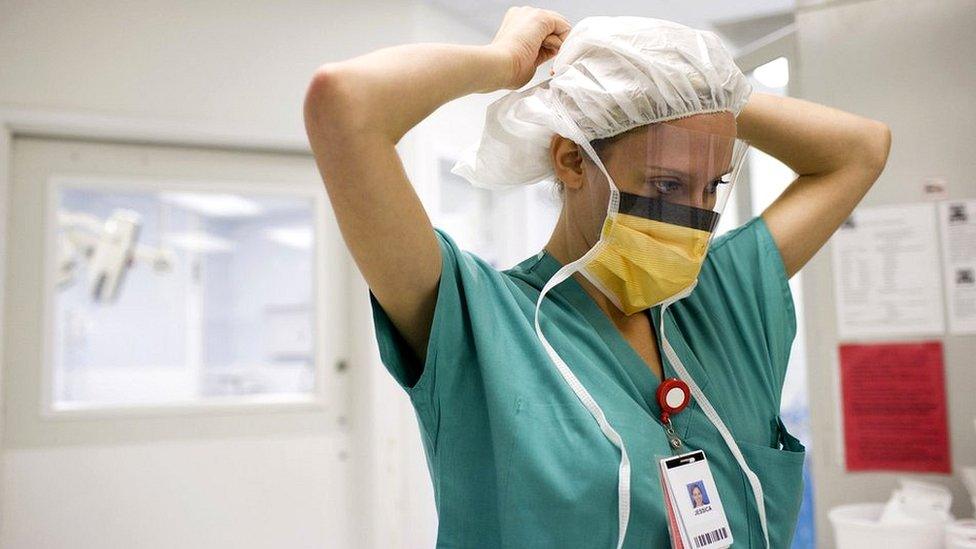Biggest squeeze for public sector pay in 20 years
- Published

Public sector pay for jobs such as NHS workers, teachers and civil servants fell further behind price rises in the three months to February, figures show.
While wages rose for public sector workers, price rises outpaced them meaning a 3% drop in spending power, the biggest fall in 20 years.
In contrast, an average private sector employee's wage bought 0.5% less.
The latest inflation figures show the cost of living is rising at its fastest pace for 30 years.
"Basic pay is now falling noticeably in real terms," said Darren Morgan from the Office for National Statistics, external describing the fall in spending power.
The most recent figures show that inflation reached 6.2% in February and new data, due out on Wednesday, is expected to show a further rise in March.
'The cutbacks start to add up'
Tom Southern, a recruitment consultant from Macclesfield, says he and family are having to make cutbacks because of the rising cost of living.
The 30-year-old says he recently moved jobs to get a better salary, but it still does not go far enough.

"We're not massively uncomfortable, we have a house and two cars. But it's the little cutbacks you have to make, it starts to add up."
The father of three says it costs £1.80 a litre to put diesel in the family car and their energy bill has gone from £69 to £268 a month. Their weekly shop at Aldi is up from £50-60 to £80-90.
Tom and his partner, who is a midwife, also have loans to pay, childcare costs, and are getting married this month which is another bill to pay.
"I don't see myself as unfortunate, it's other people I feel sorry for," he says. "I don't see how single parents or people on a low wage can make ends meet."
Falling unemployment
The ONS said the unemployment rate fell to 3.8% from 3.9% last month.
Capital Economics said the fall in unemployment was mainly due to people taking themselves out of the workforce by retiring or by looking after family or long-term sick.
Ruth Gregory, senior UK economist at Capital Economics, said the number of people classed as inactive rose by 76,000 in the three month period.


At the start of the week, the annual rise in benefits and the state pension came into force. The increase was 3.1%. Now official figures show the average wage is going up by 4%.
In normal times, that sounds like a decent rise in income, but these are not normal times.
Households are watching most things get more expensive. Prices are rising at over 6% a year and accelerating, outstripping the uplift in benefits and pay. Remember, the target rate for price increases in the economy, as measured by inflation, is 2%.
That leaves policymakers with a headache.
Either people continue to get worse off, increasing poverty and putting added strain on individuals and the welfare system. Or workers get big pay rises, which bosses can only pay for by putting up prices again - creating what is called an inflationary spiral.
Targeted support for those in the most need is another option. Ultimately, it may be that everyone feels some short-term financial pain in the hope, and belief, that those prices rises slow to the 2% target as soon as possible.

The number of job vacancies reached a fresh high of 1.29 million between January and March - a rise of 492,400 roles compared with the pre-pandemic first three months of 2020.
The ONS said the highest rate of vacancies was in construction, which rose by 18.7% in the first three months of the year. Sectors such as hotels and food services, including restaurants, and entertainment saw job openings increase by 13.1%.
However, there was a fall in demand for people in the gas and electricity sectors where vacancy rates dropped by 14%.
Chancellor Rishi Sunak said the latest figures "show the continued strength of our jobs market", adding that the government was "helping to cushion the impacts of global price rises through over £22bn of support for the cost of living this financial year".
But Labour's shadow chief secretary to the Treasury, Pat McFadden, said the data shows that "Conservative choices are leaving real wages squeezed and people worse off".
"At a time like this, Rishi Sunak could have chosen a one-off windfall tax on huge oil and gas company profits to cut household energy bills by up to £600.
"Instead, he's decided to make Britain the only major economy to land working people with higher taxes in the midst of a cost-of-living crisis," he said.
Molly Scott Cato, Green Party finance and economy spokesperson, said: "Rather than a cost of living crisis we should see the perilous situation facing working people as a wages crisis.
"A Green government would introduce taxes on the wealthy and on pollution to fund decent pay rises so that all public service workers get a pay rise that at least matches the cost of living and begins to restore earnings lost over the last decade."
- Published11 April 2022

- Published10 April 2022
